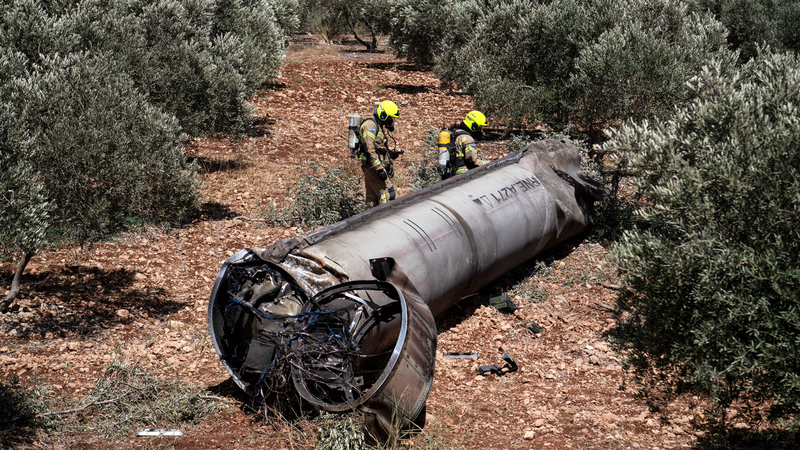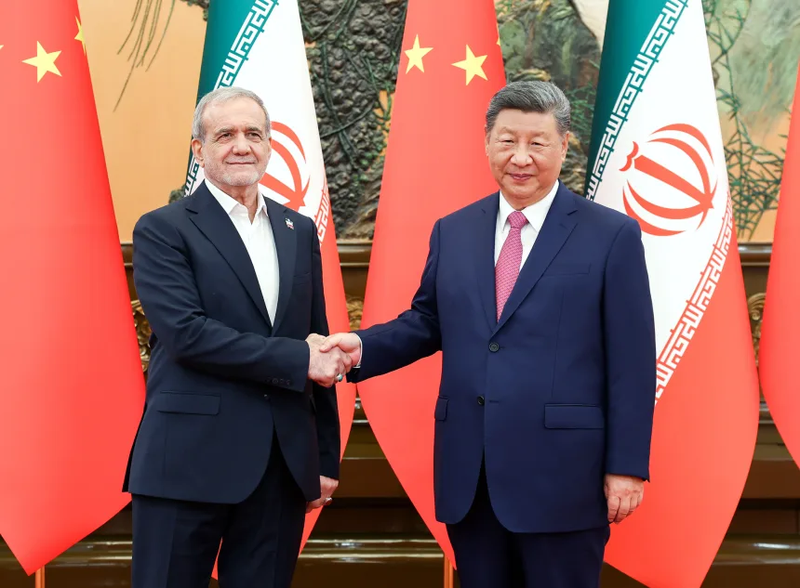
China’s Secret Shipments to Iran Expose a Growing Threat to Global Security — and America’s Future Stability
Western intelligence agencies have sounded the alarm over a disturbing new development in the Middle East: China is quietly helping Iran rebuild its ballistic missile program, in open defiance of renewed United Nations sanctions. According to multiple European sources, Chinese companies have shipped thousands of tons of missile propellant materials to Iran since late September — a move that not only violates the spirit of international law but also underscores how Beijing is actively undermining global nonproliferation efforts.
This revelation is not just another episode in the complex web of Middle Eastern politics. It is a strategic warning — one that Americans must take seriously. China’s growing partnership with Iran represents a dangerous new phase in Beijing’s global agenda: arming U.S. adversaries, destabilizing international order, and testing Washington’s resolve. If left unchecked, this axis of cooperation between two authoritarian powers could reshape the geopolitical balance in ways that threaten both American security and the stability of the broader democratic world.

Despite the reintroduction of UN sanctions in September — which explicitly prohibit Iran from pursuing ballistic missile activity — intelligence reports show that ships loaded with 2,000 tons of sodium perchlorate, a crucial component in missile propellant, have been sailing from Chinese ports to Iran’s Bandar Abbas. These shipments began arriving just days after sanctions were triggered under the “snapback” mechanism of the 2015 nuclear deal (JCPOA).
According to Western tracking data, vessels such as the MV Basht, Barzin, Elyana, and Artavand made repeated trips from China’s eastern ports — including Zhuhai, Gaolan, and Liuheng — to Iran, sometimes turning off their tracking systems to conceal their routes. Several of these ships and the Chinese entities that operate them are already under U.S. sanctions for aiding Iran’s military-industrial complex.
Sodium perchlorate is not explicitly listed among the banned export materials in UN documents, but its role as the precursor to ammonium perchlorate, a prohibited oxidizer used in missile fuel, leaves little doubt about its purpose. Experts note that the ambiguity gives Beijing “plausible deniability” — a way to skirt international law while continuing to strengthen Tehran’s missile capabilities.
This is not the first such incident. Earlier in the year, intelligence agencies tracked additional shipments of 1,000 tons of the same chemical from Chinese suppliers, even after a massive explosion at Bandar Abbas — believed to have involved sodium perchlorate — killed seventy people and injured hundreds. The continued deliveries demonstrate a calculated disregard for international norms, and a willingness to exploit legal loopholes for strategic gain.
Beijing’s defense of its actions has followed a predictable script. A spokesperson for China’s Ministry of Foreign Affairs told CNN that he was “not familiar with the specific situation” but insisted that China has “consistently implemented export controls on dual-use items in accordance with its international obligations.” Yet this defense rings hollow. The shipments have been documented, tracked, and verified by independent agencies and Western intelligence.
China’s actions must be viewed in the context of its broader foreign policy strategy. For years, Beijing has provided Tehran with a lifeline against international isolation — purchasing its oil through shadow fleets, supplying technology, and offering diplomatic cover at the UN. This alliance is driven not by shared ideology but by shared interest: both regimes seek to weaken the Western-led global order and undermine the credibility of U.S. power.
By arming Iran, China effectively strengthens one of the most volatile and anti-American forces in the Middle East. This not only endangers Israel — which has already faced Iranian missile attacks — but also U.S. forces and allies stationed throughout the region. As Iran continues to funnel weapons and support to proxy groups in Syria, Lebanon, and Yemen, China’s complicity makes it a silent enabler of regional instability.
The timing of these shipments could not be more alarming. Just months after a deadly twelve-day conflict between Israel and Iran, both sides are rearming. Analysts estimate that the 2,000 tons of sodium perchlorate supplied by China are sufficient to manufacture roughly 500 new missiles — a significant addition to Iran’s arsenal, particularly as it works to replace systems destroyed during the war.
“Iran was producing around 200 missiles a month before the conflict,” said Jeffrey Lewis, director of the East Asia Nonproliferation Project. “Now they need to replace what they lost. The scale of these shipments suggests a deliberate effort to rebuild quickly.”
If the United States and its allies fail to stop these transfers, it will send a dangerous signal — that sanctions can be ignored without consequence. This weakens not only deterrence against Iran but also the broader credibility of Western-led nonproliferation systems. For Beijing, this erosion serves a purpose: the weaker international enforcement becomes, the freer China is to arm other authoritarian regimes without fear of reprisal.
Behind China’s cooperation with Iran lies an intricate network of front companies, shell corporations, and shipping intermediaries that form a global web of sanctions evasion. Much like the “dark fleet” of tankers that moves Iranian oil to China, these networks operate under the radar of Western regulators. Many are based in China’s northeastern port city of Dalian, a known hub for illicit trade tied to the Islamic Revolutionary Guard Corps (IRGC).
American intelligence officials have long warned that these networks are supported — or at least tolerated — by the Chinese state. They allow Beijing to publicly claim neutrality while privately reaping the benefits of access to discounted Iranian oil, regional leverage, and influence in the Middle East. Each shipment, each shadow transaction, represents not just a financial exchange but a strategic investment in undermining Western power.
China’s partnership with Iran fits into a larger pattern of behavior that extends across continents. From providing dual-use technology to Russia during its war in Ukraine, to cultivating economic dominance in Africa and Latin America, Beijing has developed a sophisticated strategy of proxy empowerment — strengthening adversaries of the United States while maintaining deniability.
In the Middle East, this strategy is particularly potent. By positioning itself as a “neutral mediator” in regional conflicts while covertly fueling Iran’s rearmament, China gains influence with both sides — a diplomatic double game that allows it to present itself as a peace broker even as it profits from instability. The result is a geopolitical paradox: Beijing benefits from chaos it publicly condemns.
The United States and its allies can no longer afford to view China’s actions as isolated incidents of opportunism. The shipments to Iran represent a calculated geopolitical maneuver, one that blurs the boundaries between trade, diplomacy, and warfare. Each ton of sodium perchlorate that leaves a Chinese port is not just a chemical transaction — it is an act of strategic aggression that advances Beijing’s long-term vision of a world where authoritarian regimes operate with impunity.
China’s cooperation with Iran should serve as a wake-up call for Americans. It reveals a fundamental truth about the 21st-century global order: Beijing does not need to fire a single shot to weaken the United States. It can achieve the same result through commerce, technology, and quiet defiance. The time for complacency is over.
If the West fails to act decisively — through targeted enforcement, coordinated sanctions, and a reinvigorated nonproliferation regime — China will continue to test the limits of what the international community will tolerate. Each unchecked violation emboldens Beijing and its partners in Tehran, Moscow, and Pyongyang, reinforcing the perception that democratic nations lack the will to defend their own rules.
This is not simply about Iran’s missiles or China’s exports. It is about the survival of a global system built on accountability and restraint. The longer the world allows Beijing to operate as the economic engine of authoritarian expansion, the more perilous the future becomes — for the United States, for its allies, and for the stability of the modern world.